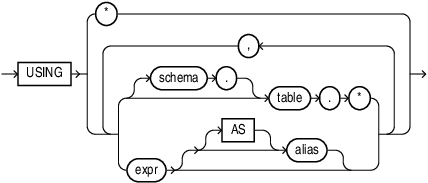44.18 VECTOR_EMBEDDING
Syntax
vector_embedding::=
Analytic Syntax
mining_attribute_clause::=
Purpose
Use VECTOR_EMBEDDING if you want to
generate a single vector embedding for different data types. To get embedding, this function
uses pretrained ONNX embedding machine learning models.
Syntax Choice
The function accepts the following types as input:
VARCHAR2 for text embedding models. Oracle automatically
converts any other type to VARCHAR2 except for NCLOB,
which will be automatically converted to NVARCHAR2. Oracle does not expect
values whose textual representation exceeds the maximum size of a VARCHAR2,
since embedding models support only text that translates to a couple thousand tokens. An
attribute with a type that has no conversion to VARCHAR2 results in a SQL
compilation error.
The function always returns a VECTOR type, whose dimension is
dictated by the model itself. The model stores the dimension information in metadata within
the data dictionary.
You can use VECTOR_EMBEDDING in SELECT
clauses, in predicates, and as an operand for SQL operations accepting a
VECTOR type.
See Also:
Parameters:
model_name refers to the name of the imported
embedding model that implements the embedding machine learning function.
Use the first syntax to score the data with a pre-defined model. Supply the name of an embedding model.
mining_attribute_clause
The mining_attribute_clause is one of the following:
- The
mining_attribute_clauseargument identifies the column attributes to use as predictors for scoring. This is used as a convenience, as embedding operator only accepts single input value. USING *: all the relevant attributes present in the input (supplied in JSON metadata) are used. This is used as a convenience. For an embedding model, the operator only takes one input value as embedding models have only one column.USING <column expression> [AS <alias>] [, <column expression> [AS <alias>] ]: all the relevant attributes present in the comma-separated list of column expressions are used. This syntax is consistent with the syntax of other machine learning operators. You may specify more than one attribute, however, the embedding model only takes one relevant input. Therefore, you must specify a single mining attribute.
The operator always returns a VECTOR type, whose dimension is
dictated by the model itself. The model stores the dimension information in metadata within
the data dictionary.
The operator accepts values of the following types for its input attribute:
Example
The following example generates vector embeddings with
"hello" as the input, utilizing the pretrained ONNX format model
my_embedding_model.onnx imported into the Database. For complete example,
see Import ONNX Models and Generate
Embeddings.
SELECT TO_VECTOR(VECTOR_EMBEDDING(model USING 'hello' as data)) AS embedding;
--------------------------------------------------------------------------------
[-9.76553112E-002,-9.89954844E-002,7.69771636E-003,-4.16760892E-003,-9.69305634E-002,
-3.01141385E-002,-2.63396613E-002,-2.98553891E-002,5.96499592E-002,4.13885899E-002,
5.32859489E-002,6.57707453E-002,-1.47056757E-002,-4.18472625E-002,4.1588001E-002,
-2.86354572E-002,-7.56499246E-002,-4.16395674E-003,-1.52879998E-001,6.60010576E-002,
-3.9013084E-002,3.15719917E-002,1.2428958E-002,-2.47651711E-002,-1.16851285E-001,
-7.82847106E-002,3.34323719E-002,8.03267583E-002,1.70483496E-002,-5.42407483E-002,
6.54291287E-002,-4.81935125E-003,6.11041225E-002,6.64106477E-003,-5.47